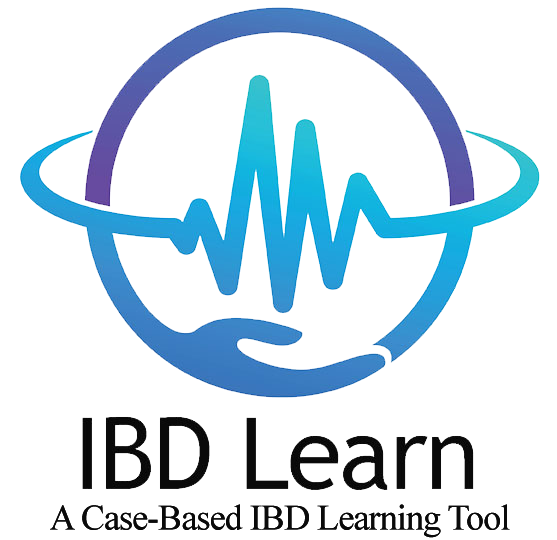Learning Objectives
- Perform an appropriate diagnostic work-up for the outpatient presenting with symptoms suggestive of mild to moderate ulcerative colitis.
- Select appropriate initial therapy for the outpatient with low risk, mild-moderate ulcerative colitis.
IBD EPAs
- EPA 1: Classify Inflammatory Bowel Disease Phenotype, Disease Activity, and Extraintestinal Manifestations
- EPA 2: Utilize Advanced Diagnostic and Therapeutic Endoscopic and Radiographic Techniques in the Management of Inflammatory Bowel Disease
- EPA 3: Prescribe and Manage Evidenced-based Inflammatory Bowel Disease Therapies Utilizing Clinical Pharmacologic Principles in Clinical Practice
This patient’s history, endoscopy, and biopsies are all consistent with ulcerative colitis. The hallmark endoscopic finding in UC is symmetric and continuous inflammation beginning in the rectum and extending proximally. The Mayo endoscopic score is frequently used in practice and clinical trials for grading severity of UC during colonoscopy. The ratings are defined as 0, normal or inactive disease; 1, mild disease (erythema, decreased vascular pattern, mild friability); 2, moderate disease (marked erythema, absent vascular pattern, friability, erosions); 3, severe disease (spontaneous bleeding, ulceration).
The precise definition of mild to moderate ulcerative colitis varies; the 2019 AGA Guidelines define mild to moderate UC as < 4-6 stools per day, mild-moderate rectal bleeding, absence of constitutional symptoms, low overall inflammatory burden, and absence of features suggestive of high inflammatory activity. The 2019 ACG guidelines propose a definition of mild UC as < 4 stools per day, intermittent bloody stool, mild/occasional urgency, absence of anemia, ESR < 30 with elevated CRP, calprotectin >150, and a Mayo 1 endoscopic score or score of 2-4 on the UC Endoscopic Index of Severity. This patient seems to fit these definitions of mild-moderate UC based on her symptoms and endoscopic disease activity.
In patients with mildly active left sided ulcerative colitis, rectal 5-ASA enemas combined with oral 5-ASA is recommended over either therapy alone for induction of remission. This recommendation is supported by the results of a meta-analysis of 4 randomized controlled trials of combination oral/rectal 5-ASA versus oral 5-ASA alone, with a relative risk for induction failure of 0.65 for combination therapy . If patients are intolerant or nonresponsive to 5-ASA at doses of at least 2 g/day orally and/or 1 g/day rectally, oral budesonide MMX or oral systemic corticosteroids should be considered for induction of remission. Once remission is achieved, steroids should be discontinued, and oral 5-ASA therapy (at least 2 g/day) is preferred for maintenance of remission in left-sided or extensive UC, while rectal 5-ASA (at least 1 g/day) is preferred for ulcerative proctitis. Relapse on maintenance 5-ASA should be managed according to the algorithm for the high-risk outpatient according to the 2015 AGA UC care pathway; recurrent flares and need for glucocorticoids predict a more complicated disease course and should move the patient out of the mild-moderate or low risk category.
Click here to move on to the post test
Click here to return to start of case
